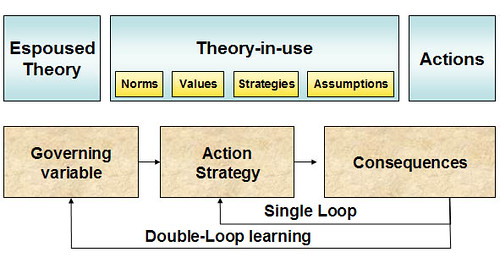A Theory of Action
Organisations are complex adaptive systems however, good models such as Argyris & Schön’s apply cognitive theory to explain how they learn, and the complex interactions between the types of learning in organisational contexts.
Figure 1: A theory of action (Argyris & Schon, 1996)
The term “espoused theory” means the theory of action which is claimed to explain or justify a given pattern of activity. The “theory-in-use” however, is a tacit theory of action implicit in the performance of the actual activity. (Argyris and Schön, 1996, p.13) As shown in Figure 1, this theory is driven by cultural norms, values, strategies and assumptions. This theory-in-use must be discovered through observation. The consequences of an activity are seen as a result of the espoused theories, seen as governing variables, as modified by the often tacit action strategy based on the theory-in-use.
Single-loop Learning
Single-loop learning is thus an active process of organisational enquiry that results in the modification of the theory-in-use to keep organisational performance within acceptable parameters based on values and accepted norms. The values and norms themselves – the governing variables – are not changed (Argyris and Schön, 1996, p.20).
Double-loop Learning
Double-loop learning (Figure 1) involves the exploring and sometimes painful reconsideration of values and strategies. This can be done individually or on behalf of an organisation when agents reassess the effectiveness of the organisational values.
Double loop learning is a critical part of an organisations culture of it is to maintain unity of vision and purpose during times of conflicting requirements or environmental change.
Deutero-learning and Unlearning
The process of managing the first two types of learning is referred to as deutero-learning. This is an acknowledgement that the organisation (or individual) must have in place learning systems that encourage inquiries about performance to be properly managed, overcoming a recognised tendency for higher level learning to be rather ill-defined and ambiguous (Fiol and Lyles, 1985, p808).
Another possible result of deutero-learning is the concept of unlearning (McGill and Slocum Jr., 1993) where old assumptions and values are challenged and replaced with new, more effective frameworks for interpretation and understanding. This concept of deutero-learning is an essential one for continuous improvement and should be encouraged within the culture of the organisation through management focus, coupled with a willingness to allow members to learn from their mistakes.
Communities of Practice and Knowledge Networks
In general, even the “top-down” experts recognise that organisational cultures are not homogenous. Both Schein and Hofstede are renowned for their ‘levels’ of culture, and concepts of sub-cultures, however a cognitive view of the organisation sees manifold, dynamic, informal links between individual actors over time. Cross & Prusak (2003) describe some excellent techniques for mapping and using these affiliations to better manage knowledge flows and detect information bottlenecks.
But for those leaders who are willing to see themselves as more sponsor than emperor, a valuable organisational form that takes advantage of knowledge networks in a more formal way is called Communities of Practice (CoP). Defined as groups of people informally bound together by shared expertise and passion for joint enterprise (Wenger, 2001, p.2), the organic and informal nature of CoPs makes them resistant to supervision and interference. However Seely-Brown & Duguid claim:
Knowledge Management focuses on effectiveness more than efficiency. It's bottom up! It assumes that managers can best foster knowledge by responding to the inventive, improvisational ways people actually get things done. (Seely Brown and Duguid, 2001, p.47)
So as an organisation develops a knowledge sharing culture, knowledge networks and the tools they offer become powerful drives for increased innovation, responsiveness and performance.






0 Comments